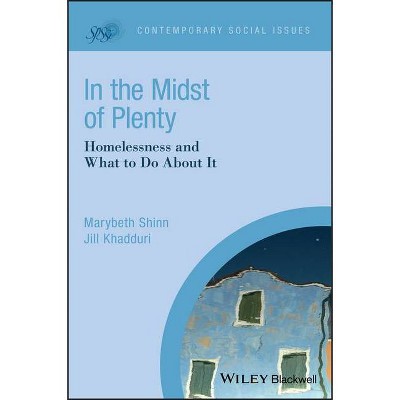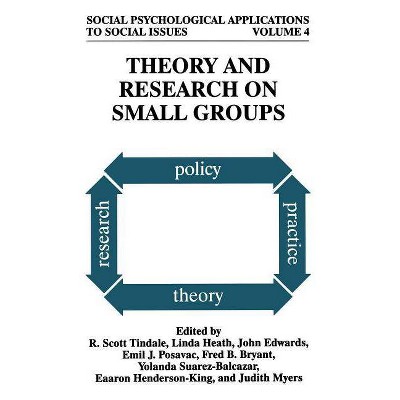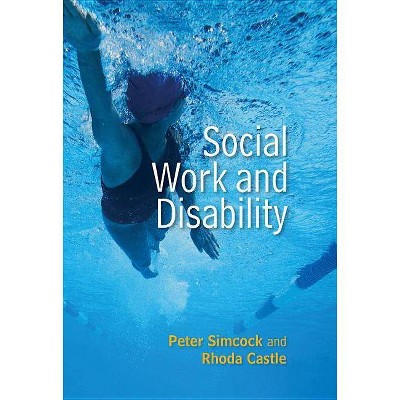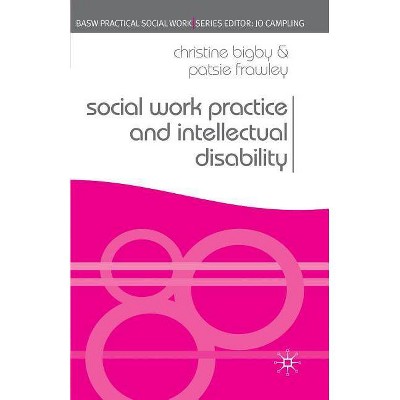Ableism: The Causes and Consequences of Disability Prejudice - (Contemporary Social Issues) by Michelle R Nario-Redmond (Paperback)
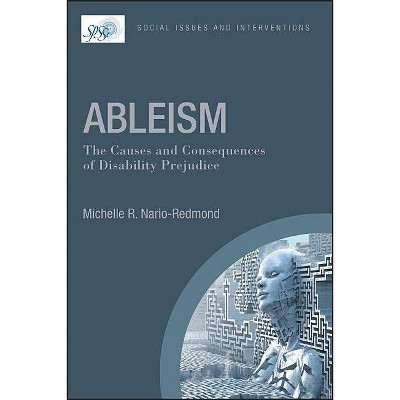
Similar Products
Products of same category from the store
AllProduct info
<p/><br></br><p><b> About the Book </b></p></br></br>Ableism, prejudice against disabled people stereotyped as incompetent and dependent, can elicit a range of reactions that include fear, contempt, pity, and inspiration. Current literature--often narrowly focused on a specific aspect of the subject or limited in scope to psychoanalytic tradition--fails to examine the many origins and manifestations of ableism. Filling a significant gap in the field, Ableism: The Causes and Consequences of Disability Prejudice is the first work to synthesize classic and contemporary studies on the evolutionary, ideological, and cognitive-emotional sources of ableism. This comprehensive volume examines new manifestations of ableism, summarizes the state of research on disability prejudice, and explores real-world personal accounts and interventions to illustrate the various forms and impacts of ableism. This important contribution to the field combines evidence from multiple theoretical perspectives, including published and unpublished work from both disabled and nondisabled constituents, on the causes, consequences, and elimination of disability prejudice. Each chapter places findings in the context of contemporary theories--identifying methodological limits and suggesting alternative interpretations. Topics include the evolutionary and existential origins of disability prejudice, cultural and impairment-specific stereotypes, interventions to reduce prejudice, and how to effect social change through collective action and advocacy. Adopting a holistic approach to the study of disability prejudice, this accessibly-written volume: provides an inclusive, up-to-date exploration of the origins and expressions of ableism, addresses how to resist ableist practices, prioritize accessible policies, and create more equitable social relations with pages earmarked for activists and allies, focuses on interpersonal and intergroup analysis from a social-psychological perspective, integrates research from multiple disciplines to illustrate critical cognitive, affective and behavioral mechanisms and manifestations of ableism, suggests future research directions based on topics covered in each chapter.<p/><br></br><p><b> Book Synopsis </b></p></br></br><p><b>The first comprehensive volume to integrate social-scientific literature on the origins and manifestations of prejudice against disabled people</b></p> <p>Ableism, prejudice against disabled people stereotyped as incompetent and dependent, can elicit a range of reactions that include fear, contempt, pity, and inspiration. Current literature--often narrowly focused on a specific aspect of the subject or limited in scope to psychoanalytic tradition--fails to examine the many origins and manifestations of ableism. Filling a significant gap in the field, <i>Ableism: The Causes and Consequences of Disability Prejudice</i> is the first work to synthesize classic and contemporary studies on the evolutionary, ideological, and cognitive-emotional sources of ableism. This comprehensive volume examines new manifestations of ableism, summarizes the state of research on disability prejudice, and explores real-world personal accounts and interventions to illustrate the various forms and impacts of ableism.</p> <p>This important contribution to the field combines evidence from multiple theoretical perspectives, including published and unpublished work from both disabled and nondisabled constituents, on the causes, consequences, and elimination of disability prejudice. Each chapter places findings in the context of contemporary theories--identifying methodological limits and suggesting alternative interpretations. Topics include the evolutionary and existential origins of disability prejudice, cultural and impairment-specific stereotypes, interventions to reduce prejudice, and how to effect social change through collective action and advocacy. Adopting a holistic approach to the study of disability prejudice, this accessibly-written volume: </p> <ul> <li>Provides an inclusive, up-to-date exploration of the origins and expressions of ableism</li> <li>Addresses how to resist ableist practices, prioritize accessible policies, and create more equitable social relations with pages earmarked for activists and allies</li> <li>Focuses on interpersonal and intergroup analysis from a social-psychological perspective</li> <li>Integrates research from multiple disciplines to illustrate critical cognitive, affective and behavioral mechanisms and manifestations of ableism</li> <li>Suggests future research directions based on topics covered in each chapter</li> </ul> <p><i>Ableism: The Causes and Consequences of Disability Prejudice</i> is an important resource for social, community and rehabilitation psychologists, scholars and researchers of disability studies, and students, activists, and academics across political, sociological, and humanistic disciplines.</p><p/><br></br><p><b> From the Back Cover </b></p></br></br><p><b>The first comprehensive volume to integrate social-scientific literature on the origins and manifestations of prejudice against disabled people</b> <p>Ableism, prejudice against disabled people stereotyped as incompetent and dependent, can elicit a range of reactions that include fear, contempt, pity, and inspiration. Current literature--often narrowly focused on a specific aspect of the subject or limited in scope to psychoanalytic tradition--fails to examine the many origins and manifestations of ableism. Filling a significant gap in the field, <i>Ableism: The Causes and Consequences of Disability Prejudice</i> is the first work to synthesize classic and contemporary studies on the evolutionary, ideological, and cognitive-emotional sources of ableism. This comprehensive volume examines new manifestations of ableism, summarizes the state of research on disability prejudice, and explores real-world personal accounts and interventions to illustrate the various forms and impacts of ableism. <p>This important contribution to the field combines evidence from multiple theoretical perspectives, including published and unpublished work from both disabled and nondisabled constituents, on the causes, consequences, and elimination of disability prejudice. Each chapter places findings in the context of contemporary theories--identifying methodological limits and suggesting alternative interpretations. Topics include the evolutionary and existential origins of disability prejudice, cultural and impairment-specific stereotypes, interventions to reduce prejudice, and how to effect social change through collective action and advocacy. Adopting a holistic approach to the study of disability prejudice, this accessibly-written volume: <ul> <li>Provides an inclusive, up-to-date exploration of the origins and expressions of ableism</li> <li>Addresses how to resist ableist practices, prioritize accessible policies, and create more equitable social relations with pages earmarked for activists and allies</li> <li>Focuses on interpersonal and intergroup analysis from a social-psychological perspective</li> <li>Integrates research from multiple disciplines to illustrate critical cognitive, affective and behavioral mechanisms and manifestations of ableism</li> <li>Suggests future research directions based on topics covered in each chapter</li> </ul> <p><i>Ableism: The Causes and Consequences of Disability Prejudice</i> is an important resource for social, community and rehabilitation psychologists, scholars and researchers of disability studies, and students, activists, and academics across political, sociological, and humanistic disciplines.<p/><br></br><p><b> About the Author </b></p></br></br><p><b>MICHELLE R. NARIO-REDMOND</b> is a Professor of Psychology at Hiram College, specializing in stereotyping, prejudice, and disability studies. Her research focuses on group identification and political advocacy, strategies of responding to prejudice, and the unintended consequences of simulating disability. She is a member of the Society for the Psychological Study of Social Issues and the Society of Disability Studies.
Price History
Cheapest price in the interval: 51.99 on November 8, 2021
Most expensive price in the interval: 51.99 on December 20, 2021
Price Archive shows prices from various stores, lets you see history and find the cheapest. There is no actual sale on the website. For all support, inquiry and suggestion messagescommunication@pricearchive.us
